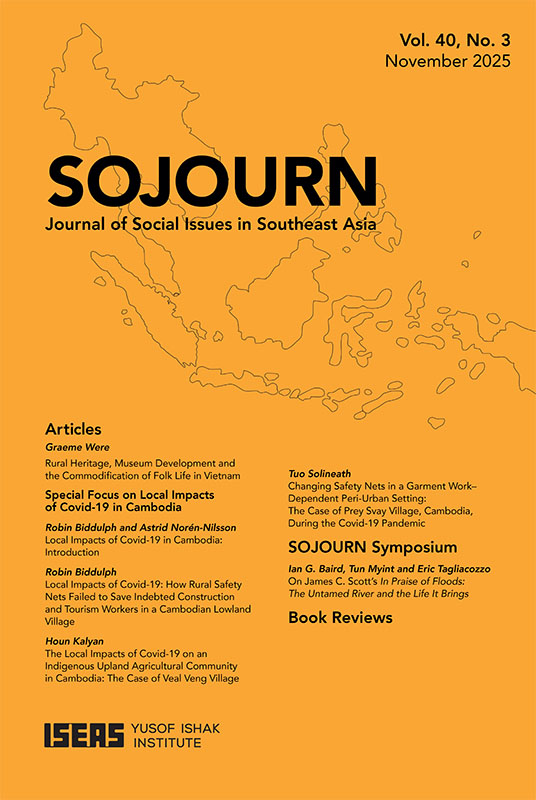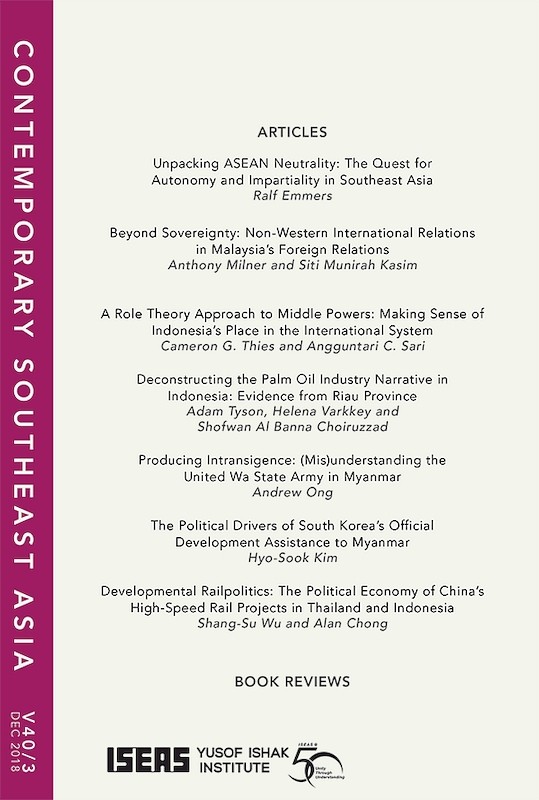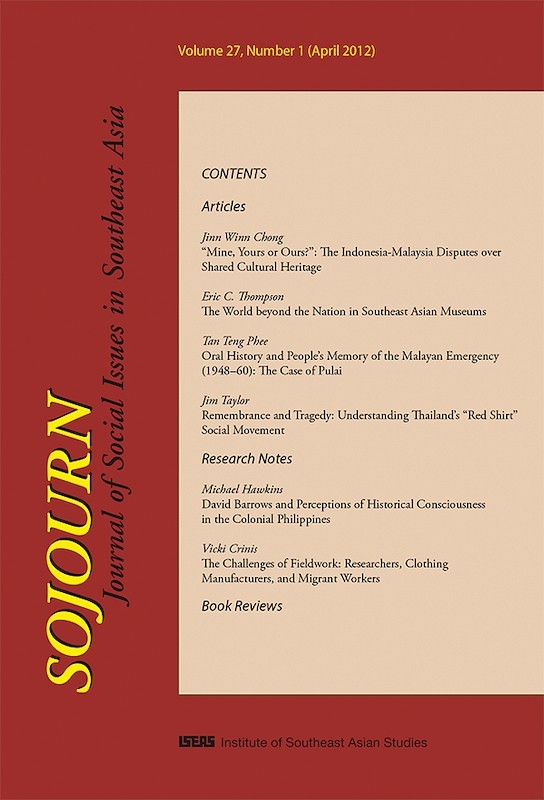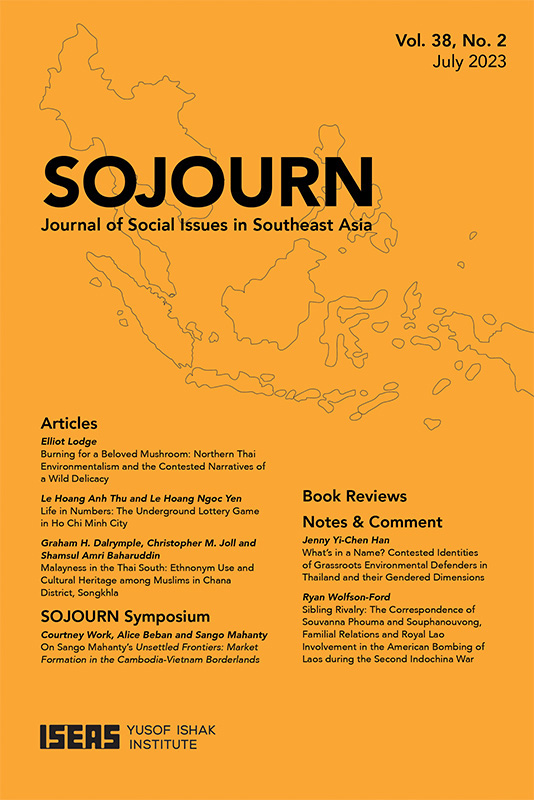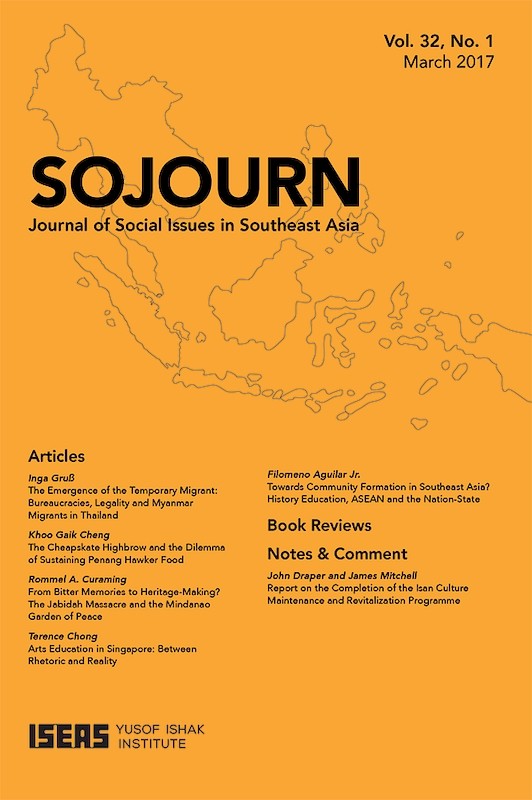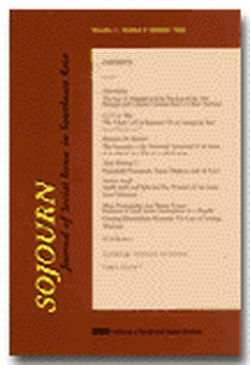SOJOURN: Journal of Social Issues in Southeast Asia Vol. 30/1 (March 2015)
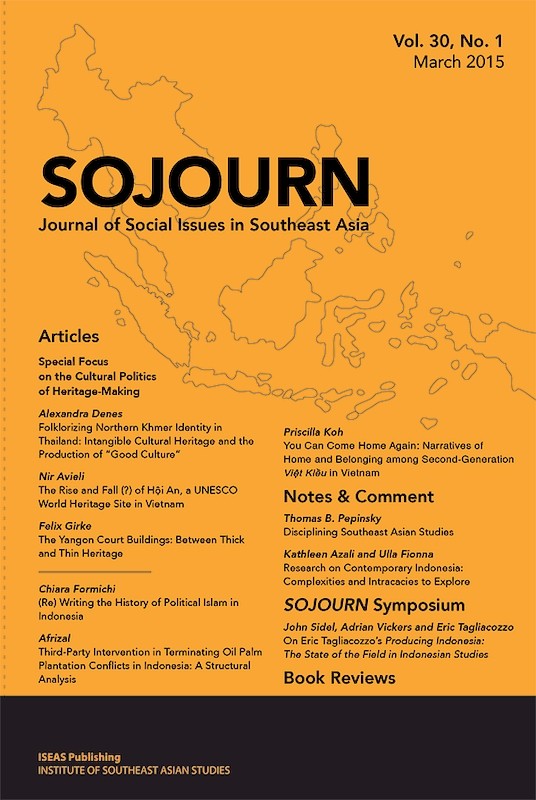
Date of publication:
March 2015
Publisher:
Institute of Southeast Asian Studies
Number of pages:
299
Code:
SJ30/1
Contents
-
SOJOURN: Journal of Social Issues in Southeast Asia Vol. 30/1 (March 2015)
[Whole Publication, ISSN: 17932858] -
Preliminary pages
- ARTICLES Special Focus on the Cultural Politics of Heritage-Making
-
Folklorizing Northern Khmer Identity in Thailand: Intangible Cultural Heritage and the Production of "Good Culture", by Alexandra Denes, author see abstractGrowing recognition of the contested nature of heritage has prompted critical reassessments of official heritage discourses and the demand for more inclusive heritage processes. Field research in Surin, Thailand, reveals the challenges of implementing participatory approaches in a context in which the concept of cultural heritage is employed to domesticate the nation’s ethnic Others. The history of state-sponsored, folklorized performances of the ethnic Khmer genre of kantruem demonstrates the ways in which the recent listing of kantruem on Thailand’s national registry of “intangible culture” elides histories of cross-border linkage with Cambodia and meanings of kantruem as a site of memory and affect
-
The Rise and Fall (?) of Hội An, a UNESCO World Heritage Site in Vietnam, by Nir Avieli, author see abstractThe title of UNESCO “World Heritage Site” is a much desired marker of quality tourism. Yet social scientists rarely discuss the designation’s impact on specific locales, the programme’s effectiveness or its negative effects. Ethnographic fieldwork conducted at the World Heritage Site of Hội An in Vietnam since 1998 permits exploration of the practices, processes and outcomes of achieving World Heritage Site status, as well as of the impact of that status on the lives of local people. The World Heritage project fails in its approach to cultural heritage in less affluent destinations, hardly protects material heritage and possibly contributes to the destruction of the sites that it aims to protect.
-
The Yangon Court Buildings: Between Thick and Thin Heritage, by Felix Girke, author see abstractMany colonial-era buildings in Yangon stand neglected or deserted. With global resonance, the Yangon Heritage Trust has spearheaded efforts to conserve the city’s unique legacy. But rather than focusing on particular histories of buildings and on local perspectives on them, the dominant view of “thin” heritage propagated today emphasizes age, aesthetics and generalized importance. Protests against the privatization of two Yangon courthouses show the difficulties encountered by a local lawyers’ association in arguing for its members’ interests in terms of a lived “thick” heritage. The multi-vocal heritage discourse in Yangon today is in danger of being monopolized by a marketable generic idiom.
- ARTICLES
-
(Re) Writing the History of Political Islam in Indonesia , by Chiara Formichi, author see abstractThe impact of Reformasi on Indonesia has extended beyond the realms of politics and economics, also leading to changing understandings of history. For example, the institutional and popular approaches to the Darul Islam movement (1947–65) and its leader Kartosuwiryo have shifted in Indonesian publications released between the 1940s and the 2010s. These approaches place varying degrees of emphasis on their rebellious or Islamic character. A trajectory from condemnation to glorification illustrates that, whilst formal political transitions are useful to gauge historiographical shifts, in the case at hand there is more continuity than change across regimes, and much nuanced variation within each politically defined era. Revisionism has also appeared in Indonesian military historiography.
-
Third-Party Intervention in Terminating Oil Palm Plantation Conflicts in Indonesia: A Structural Analysis, by Afrizal, author see abstractAcademic literature emphasizes the importance of agents in conflict resolution analysis and neglects the influence of structure. A study of the resolution of conflict between the people of Pangean Village, Riau Province, and an oil palm plantation company shows that structure contributes to the resolution process and to the outcome of conflict. The conflict in question concerned a plot of land cultivated by PT Citra Riau Sarana (PT CRS) as part of its oil palm plantation and by smallholders linked to the company. The local district government tried but was unable to end the conflict. With the involvement of an NGO, the people of Pangean Village and PT CRS succeeded in reaching consensus, in implementing written agreements and in resolving their conflict.
-
You Can Come Home Again: Narratives of Home and Belonging among Second-Generation Việt Kiều in Vietnam, by Priscilla Koh, author see abstractOver the last decade, increasing numbers of second-generation overseas Vietnamese or Việt Kiều have returned to Vietnam to live and work. These are children of first-generation immigrant parents, who fled the country following the communist victory over South Vietnam in 1975. Since the 1990s, the government has implemented new laws and policies to encourage overseas Vietnamese to return to invest, work and live in Vietnam. However, recent state initiatives have also been hampered by substantial ambiguities and bureaucratic inefficiency. The narratives of second-generation Việt Kiều living in Hồ Chí Minh City reveal how — apart from state discourse and policies — personal motivations and pragmatic considerations also have an important bearing on their sense of “home” and “belonging” in Vietnam.
- NOTES & COMMENT
-
Disciplining Southeast Asian Studies, by Thomas B Pepinsky, author
-
Research on Contemporary Indonesia: Complexities and Intricacies to Explore, by Kathleen Azali, Ulla Fionna, authors see abstractIndonesia, the world’s most populous Muslim nation, has developed into the world’s third-largest democracy. Despite the encouraging picture of political transformation accompanied by remarkable economic growth that it presents, serious challenges and the potential for backsliding remain. Studies on Indonesia undertaken at centres outside the country have grown in number, but their authors’ engagement and dialogue with Indonesian scholars about the state of studies on Indonesia and the direction in which those studies are heading remain insufficient. To address this gap, and in collaboration with other Indonesian scholars, we outline contemporary developments in research on Indonesia. We address the ongoing and emerging studies, research gaps and future directions identified during a round table organized by the Institute of Southeast Asian Studies on 10 May 2013 in Singapore. Areas of focus are sociological and demographic trends, domestic politics, decentralization and political economy.
- SOJOURN Symposium
-
Producing Indonesia: The State of the Field in Indonesian Studies, by John Sidel, Adrian Vickers, Eric Tagliacozzo, authors
- BOOK REVIEWS
-
BOOK REVIEW: The Khmer Lands of Vietnam: Environment, Cosmology and Sovereignty by Philip Taylor, by Timothy Gorman, author
-
BOOK REVIEW: Land Politics and Livelihoods on the Margins of Hanoi, 1920-2010 by Danielle Labbé, by Erik Harms, author
-
BOOK REVIEW: It's a Living: Work and Life in Vietnam Today edited by Gerard Sasges, by Reema B Jagtiani, author
-
BOOK REVIEW: Fields of Desire: Poverty and Policy in Laos by Holly High, by Paul T Cohen, author
-
BOOK REVIEW: Remembering the Samsui Women: Migration and Social Memory in Singapore and China by Kelvin E.Y. Low, by John Clammer, author
-
BOOK REVIEW: Innovative Partners: The Rockefeller Foundation and Thailand by William H. Becker, by Michael J Montesano, author

